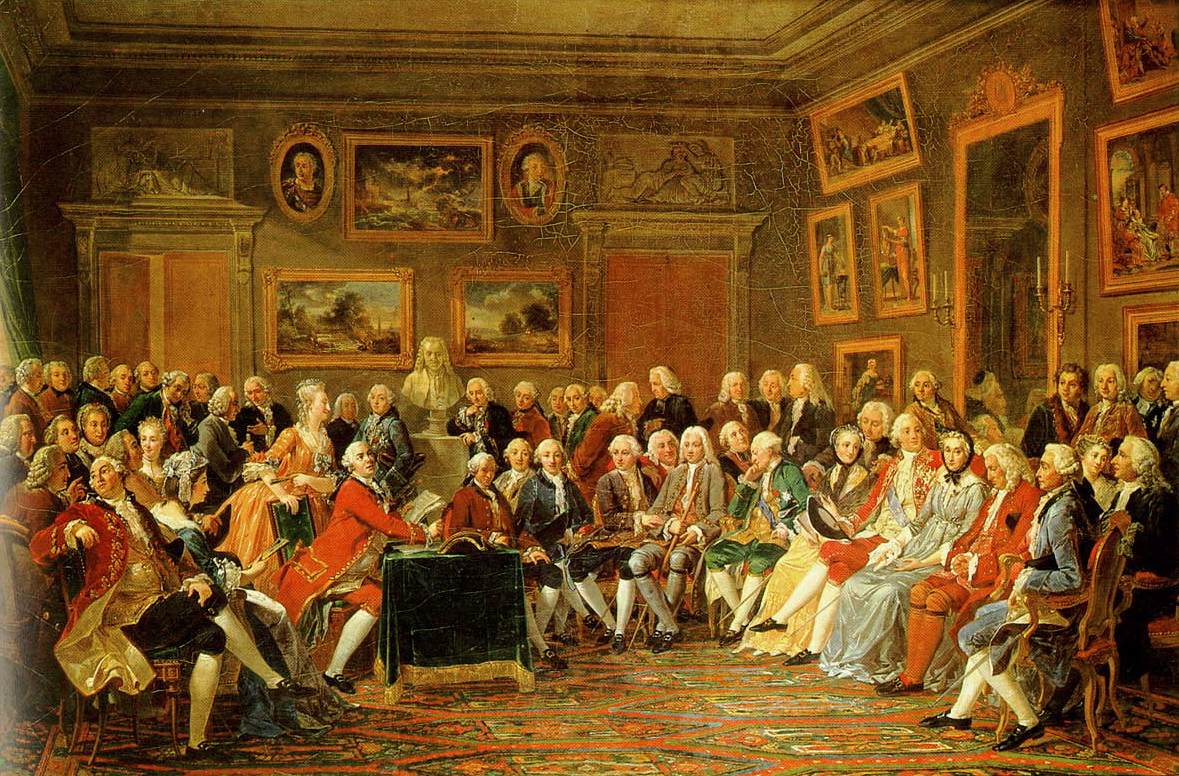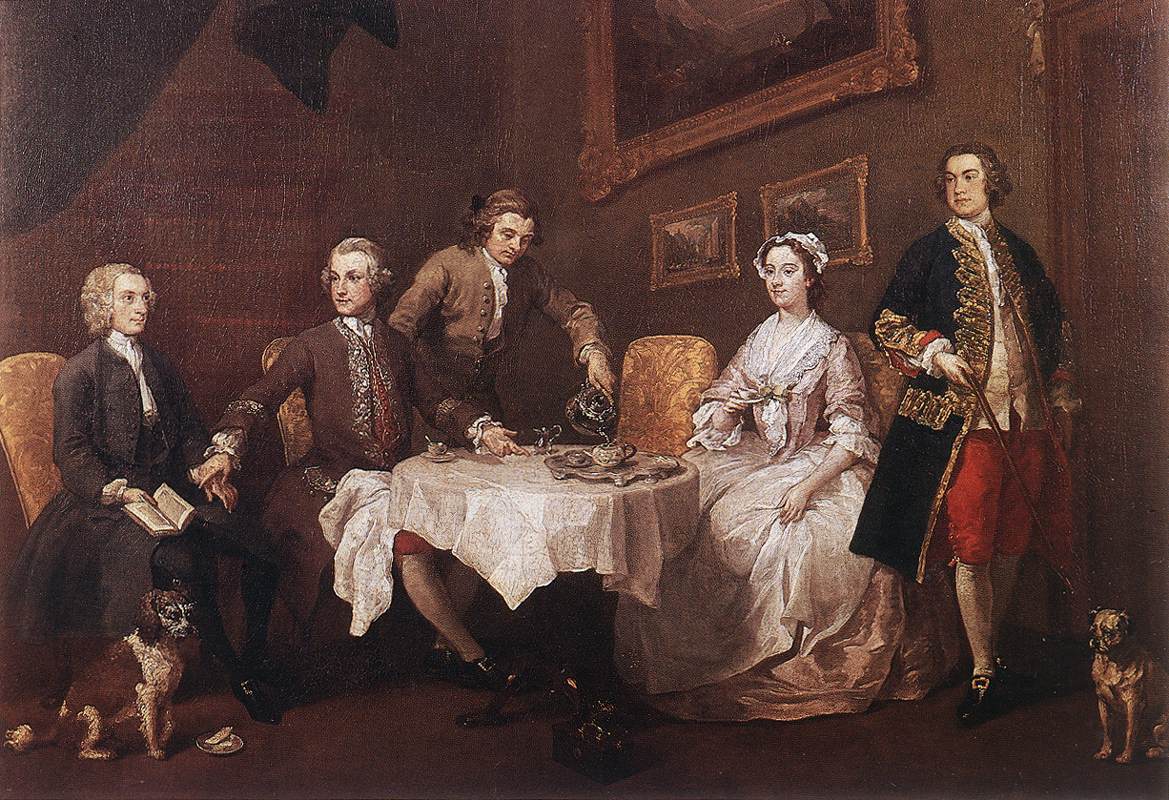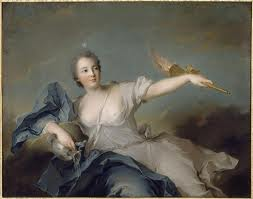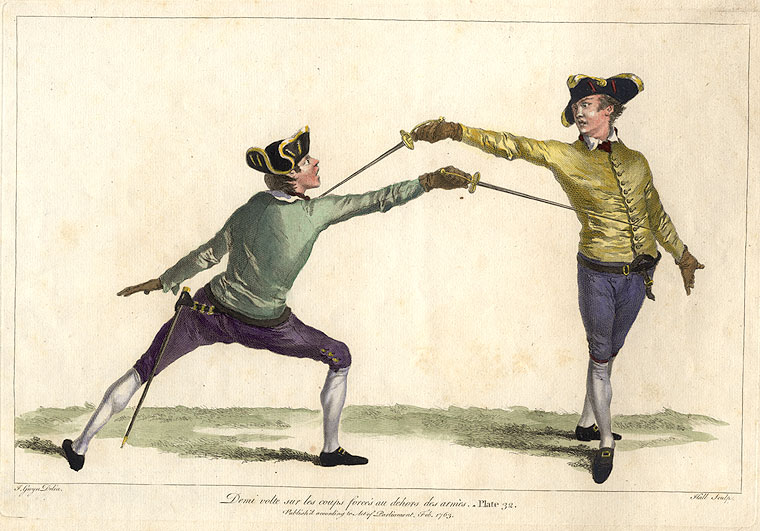Historians usually describe the 18 th century as a Golden Age for most of the major and minor Arts, with its admirable achievements, masterworks of architecture, painting, sculpture, music, literature, as well as Grand Style furniture, jewelry, tableware, tapestry, fabrics and of course Fashion. Another Art reigned supreme, though, mainly in France, where the trend was set; but it has left nearly no trace at all, because of its particularly ephemeral nature: the ART OF CONVERSATION, as practiced mostly in Salons.
This unique mix of mastery of language, verbal elegance, charming (or ferocious) wit, quicksilver replies, original insights, refined sense of finely-shaded nuances in the choice of words, charming courtesy towards one another, logic in development of ideas, and fanciful speech, was the epitome of the French-speaking European Civilization in those days.
It is our duty as Royal Courts Courtiers to revive it, just as it has been done by Creators in visual arts, with magnificent dresses, gowns and wigs, fabulous carriages and montgolfieres , and awesome chateaux .
We are responsible for keeping this lost Art alive, and I am always happy to contribute to a literary or scientific Salon where profound ideas are exchanged in this most graceful manner of the 1700s.
For those of you who have not yet attended a SL Royal Courts Salon Meeting, I will provide an (imaginary, of course) example. A transcript of the Salon would go like this:
Karl-Heinz Moderator: Ladies and Gentlemen, dear friends, I think we can begin now. We will celebrate this month the 300 th anniversary of Jean-Jacques Rousseau, the famous philosopher, and I thought it a good idea to discuss his life and works.
- Comte de Bourlemou nods
- Lady Marshmallow: Greetings everyone! Hope I am not too late?
-K-H Moderator: Not at all, Madame, please take a seat Socan anyone tell us what he knows about Rousseau?
- Comte de Bourlemou nods
-KH Moderator: Can you be a little more specific, Sir?
-Comte de Bourlemou: He was a Frenchman.
-KH Moderator: yes, he wrote in French Well, actually he was a Swiss, but lived most of his life in France, and
-Arabella Klinkscale: Hellooooo! How are you today?
-Seraphine Percepied: Arabella! where have you been?
- Arabella Klinkscale: * pouts*shopping, what do you think?
-Seraphine Percepied,( in IM to Arabella) : Where did you get this dress, bitch?
-Seraphine Percepied: Ooops, sorry, Monsieur, please go ahead with Rousseau
-KH Moderator: errrrwhat were we saying? Did anyone read a book by Rousseau?
- Comtesse de la Porte de lEscalier de la Cave: Bonjoor Bonjoor! Hi Dears! Did I miss something?
- Comte de Bourlemou: Greetings, Madame
- Lord Myron de Verne: Bonjhpur, Madomee (* my usual typonese*)
- Lady Marshmallow whispers Shhhhhh, sit down and listen, dear Comtesse 
-Lord Myron de Verne: I have read several books by Rousseau
-Comtesse de la Porte de lEscalier de la Cave: (( gorgeous dress, Arabella:-)))
-Lord Myron de Verne:...I had little time to prepare this Salon meeting, and if my English was better, i could tell you more about these books
- Comte de Bourlemou shakes his head
- Graf von Strumpf: Meine Damen und Herren!
- Graf von Strumpf bows
- Lady Marshmallow: Oh! Strumpfy! What brings you here? I did not know you were interested in French Enlightenment?
- Graf von Strumpf: Donnerwetter! Bullshit! I came here for the liquors!
- Graf von Strumpf smiles brightly
- KH Moderator: so, lets sum up what we said Rousseau was a Swiss, born in Geneva Switzerland was in those days- and still is- a confederation of free states or Lnder, a very advanced democracy, some sort of Republic
-Arabella Klinkscale: I loooove Geneva! Very clean city, a big big big lake, with a lovely big big fountain spray in the middle
-Graf von Strumpf: Ach Ja! Eine echte demokratische Republik damals,but darn Calvinist puritans, the Swiss!
-KH Moderator: you made a point, dear Graf, but lets not get too far away from our subject, though
- Principessa della Zuppa al Pomodoro creeps in silently but with majesty
- Comte de Bourlemou stands up and bows to the Principessa
- Graf von Strumpf stands up, clicks his heels ( schlagt seine Hacken zusammen), and bows even deeper
- Lord Myron de Verne stands up ( or rather jumps up like a devil out of a box, and finds himself standing on the nearby table, stomping the cakes and drinks)
- Lord Myron de Verne bows deeply to the Principessa (while still standing on the table)
- Lord Myron de Verne: Please take my seat, Principessa!
- Principessa della Zuppa al Pomodoro: awww thank you, Gentlemen, Je vous pray de reste seated , Messiours!
(KH Moderator rezzes a seat for la Principessa - and it happens to be a yellow and pink polka-dotted beanbag, which she overlooks with disdain)
-Long silence, public chat box remains empty-
-KH Moderator: So Rousseau may have been heavily influenced by his natal country, though he rejected it later and was himself rejected by
- Comte de Bourlemou: I am sorry, RL calls, I have to leave, A bientt!
- KH Moderator: See you soon, Monsieur
- Comte de Bourlemou nods
-Arabella Klinkscale: Me too! ((Gotta feed the kitty! ))
- Arabella Klinkscale giggles
- Lord Myron de Verne: I could try to translate some of Rousseau books for you , if you care for instance, Les Confessions, la Nouvelle Helose 2400 pages in all, if you are not in a hurry
- KH Moderator: Thank you, but they are already translated, Milord
- Lord Myron de Verne lurks, and looks at Lady Marshmallow, head and arms down, with an Away tag above her
- Seraphine Percepied: can I upload them for free in my Kindle?
-Principessa Della Zuppa al Pomodoro: May I have some of these cupcakes? They look delicious!
- Comtesse de la Porte de lEscalier de la Cave: personally, I prefer Voltaire
-Graf von Strumpf: Where are the liquors?
-Principessa Della Zuppa al Pomodoro: OMG! Is it THAT late? How time flies in your company! I have to rush back home, Ciaoooo!
- Graf von Strumpf clicks heels four times, turning east , west, north and south, and thanks the audience for the very interesting discussion ( * poofs*)
(Lord Myron de Verne crashes for the third time and does not come back)
-KH Moderator, staying alone with Lady Marshmallow who is afk: Well, Ladies and Gentlemen, its been a pleasure and a privilege to share these enlightening moments with you.
For our next Salon meeting, we will discuss the progress of science , most notably the steam engines.
( End of transcription)
I am proud I took my share in this remarkable experiment: of course, all this needs some polishing, but it is really comforting to see how we, Second Life Royal Courts members, strive to resuscitate the dead art of conversation, in all its brilliance and purity.
La trs vridique histoire de la Chaise Volante de Versailles
In the Year of Our Lord 1743, Louis XV, Roi de France, ordered to build a "Chaise Volante" ( Flying Chair) for his new favorite, Madame de Chateauroux.
Actually, the Royal private appartments were located on the 1er tage of Versailles, and hers on the 3e tage .
So the Chaise Volante or Flying Chair was designed to help Madame de Chateauroux to go up and downdirectly from the King's Room to hers and back, on the quadruple purpose of providing a short cut,as well asease, comfort , and of course discretion.
When Madame de Chateauroux died at the age of 27, it was rumored that the very same Chaise Volante was used by the next favorite, Madame de Pompadour. 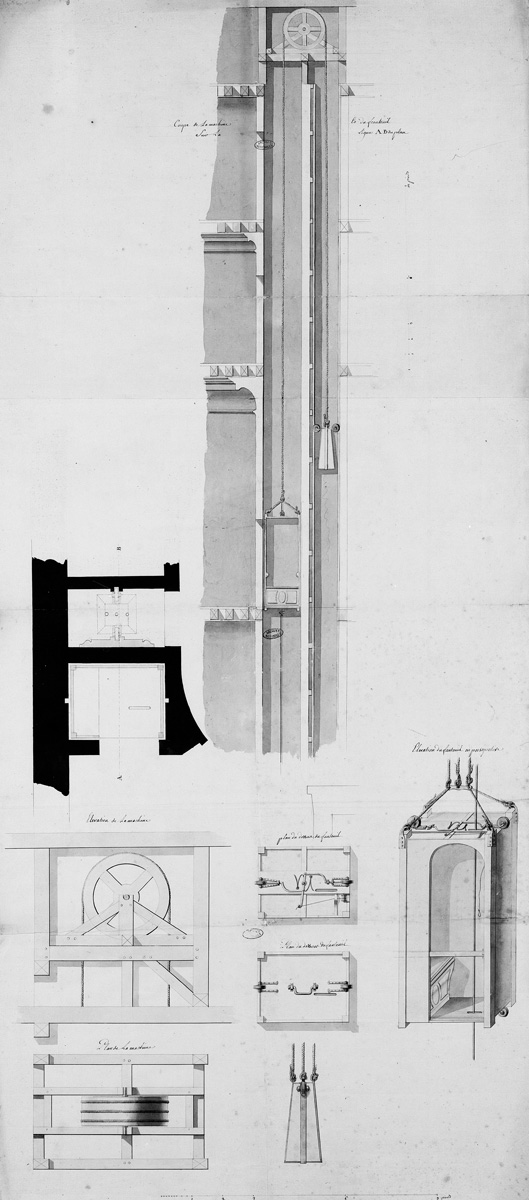
This clever system was modeled after a recent invention by Monsieur le Comte de Villayer, and built by Blaise-Henri ARNOULT, who designed the sophisticated machineries behind the scenes of the Royal Opera in Versailles.
It was made of a human-sized box with a seat, looking somewhat like a sedan-chair, sliding up inside an elevator shaft, manoeuvred by its occupant by mean of a rope vertically going through the box or cabin, and linked to a system of pulleys and counterweights. Thanks to these, the favorite, by her own energy, could reach her bedroom two stairs above, unseen and without effort.
By now, everybody has understood, that this 'Flying Chair' was indeed the forerunner of the modern elevators, and a simplified and motorless version of these.
As a conclusion, may I humbly suggest to the admirable builders of SL Versailles to include this device in their future building plans and schedules? Would'nt it be at the same time accurate and funny?
( I would enjoy personally to look at Noailles and Montbazon ra cing and rocketing through the floors:-) Although, at second thought, I doubt if they wouldlower themselves to following the same path as Courtesans and Favorites...unless they would be certain no one sees them, that is!)
The drawing besideshows someplansfor this 'Chaise Volante' - whichdoes not exist anymore-that are stored in French National Archives in Paris.
Here is a link to the website of the 'Sciences et Curiosits La Cour de Versailles' exhibition, which was held last year in the Castle ( just to show you I did not invent the whole story!)
http://sciences.chateauversailles.fr/index.php?option=com_content&view=article&id=146&Itemid=468&lang=fr
And last,but not least, the portrait hereunder shows Madame de Chateauroux, as painted by Nattier (?)
SIDE STORIES, ANECDOTES AND CHARACTERS, Part IV- Essay on the Art of Crawling, by Baron d'Holbach.
By Lord Myron de Verne, 2011-06-11
I am in a lazy mood today, so I wont write this post myself. I was amused reading the lampoon pamphlet Monsieur le baron dHolbach is just about to publish, and I will only introduce it to you. Monsieur dHolbach, as you may know, is a german scientist and philosopher (he wrote books on chemistry, physics, metallurgy, geology, mining, etcas well as on religion, law and morals (it seems he has an opinion just about everything on earth).
In 1749 he came to France, took French nationality, and befriended the French Scientists and Philosophers, providing by himself 376 entries to the Encyclopedia of Diderot and DAlembert. He welcomes, as guests in his famed Salon and at his dining table, many of the greatest characters of our time, from France and abroad, as for instance Benjamin Franklin.
This man is a materialist and atheist thinker, and reading his books is a pain in my neck, both for style and content. I only make an exception for this libel I am introducing you to. It is the perfect lampoon: harsh, insincere, cruelly unfair, BUT true in its own partial way, and with a devastating humor, very much in the Swift vein. It also has the merit of revealingwhat the people think of the Courts outside of them ( though they would not express it with the same talent).
Come on, Courtiers, lets show him we can laugh at ourselves better than he does!
((OOC P.S: of course, finding any resemblance with SL Courtiers would not only be purely coincidental, but also the mischievous fruit of a wicked mind. This is a real writing about real historical Courtiers, and not about role-players, do I need to say?))
ESSAY ON THE ART OF CRAWLING, for the use of Courtiers, by Baron DHOLBACH
The courtier is, without contradiction, the most curious product of the human race. Hes an amphibian animal in which all contrasts are commonly assembled. A Danish philosopher compares the courtier to the statue composed of different materials that Nebuchadnezzar saw in a dream. He says: The head of a courtier is of glass, his hair of gold, his hands of resin, his body of plaster, his heart is half steel half mud, his feet are of straw, and his blood of water and quicksilver.
It must be admitted that so strange an animal is difficult to define. Not only can he not be known by others, he can barely know himself. Nevertheless, it appears that, all things considered, he can be categorized in the class of men, with this difference: ordinary men have only one soul, while the courtier seems to have several. In fact, a courtier is sometimes insolent and sometimes groveling; sometimes sordidly avaricious and sometimes insatiably avid; sometimes extremely prodigal, sometimes audacious; sometimes of a shameful cowardice, sometimes of the most impertinent arrogance and sometimes of the most careful politeness. In a word, he is a Proteus, a Janus or rather a god from India, who is represented with seven faces.
Whatever the case, it is for these rare beings that nations seem to exist. Providence has destined them for their least pleasures: the sovereign himself is only their business agent. When he does his duty he has no other task than that of fulfilling their needs and their fantasies, only too happy to work for these necessary men who the state cannot do without. It is in their interest that a monarch imposes taxes, makes war or peace, imagines a thousand ingenious inventions to torment and gouge the people. In exchange for this, the grateful courtiers pay the monarch with gratitude, assiduity, flattery, and meanness; and the talent of trading thanks for these important merchandise is that which is perhaps most useful to the court.
Philosophers, who are commonly ill-humored, in truth look upon the mtier of courtier as low, as infamous, as that of a poisoner. The ungrateful people dont feel the entire extent of the gratitude they owe to these generous ones who, in order to maintain their sovereign in a good mood, devote themselves to boredom, sacrifice themselves to his caprices, continually sacrifice to him their honor, their probity, their amour propre , their shame and their remorse. Dont those imbeciles know the cost of these sacrifices? Dont they think what it must cost to be a good courtier? Whatever force of spirit one might have, however armored the conscience by the habit of holding virtue in contempt and crushing probity under foot, ordinary men always find it difficult to stifle in their hearts the cry of reason. There is only the courtier who manages to reduce that importunate voice to silence. He alone is capable of so noble an effort.
If we examine things from this point of view, we can see that of all the arts, that of crawling is the most difficult. This sublime art is perhaps the most marvelous conquest of the human spirit. Nature placed in the hearts of all men an amour propre , a pride that is, of all dispositions, the most difficult to vanquish. The soul revolts against everything that tends to depress it; it vigorously reacts whenever its wounded in that sensitive spot. And if at a young age we havent developed the habit of fighting, repressing or crushing this powerful spring, it becomes impossible to master it. This is what the courtier works at during his childhood, a study much more useful that all those that are so emphatically vaunted, and, in those who have acquired the faculty of subjugating nature, announces a strength with which few being find themselves gifted. It is through these heroic efforts, these combats, these victories that a skillful courtier distinguishes himself and reaches the point of insensitivity that leads him to credit, honors, and those grandeurs that are the object of the envy of his peers and that of public admiration.
Let them exalt after this the sacrifices religion imposes on those who want to gain heaven. Let them talk of the strength of soul of those haughty philosophers who claim to hold in contempt all that men esteem. Believers and sages could not defeat amour propre ; pride seems to be compatible with devotion and philosophy. It is only reserved to the courtier to triumph over himself and to carry off a complete victory over the sentiments of his heart. A perfect courtier is without contradiction the most amazing of all men. Dont talk to us about the abnegation of the pious; true abnegation is that of a courtier for his master: see how he obliterates himself in his presence. He becomes a pure machine, or rather he is nothing: he awaits his being from him; he seeks to find in his traits those he should have himself. He is like wax ready to receive all the impressions made on it.
There are a few mortals who have a narrow spirit, a lack of suppleness in the spine, a lack of flexibility in the neck: this unfortunate organization prevents them from perfecting themselves in the art of crawling and renders them incapable of advancing at court. Serpents and reptiles reach the heights of mountains and rocks, while the most fiery of steeds can never climb there. The court is not made for these haughty, inflexible personages who dont know how to give themselves over to the caprices, to surrender to the fantasies or even, when need be, to approve or favor those crimes grandeur deems necessary for the well being of the state.
A good courtier should never have an opinion; he should only have that of his master or minister, and his sagacity should always make sure he knows this, which presupposes a consummate experience and profound knowledge of the human heart. A good courtier should never be in the right: it isnt permitted him to have more wit than his master or the distributor of his graces. He must know that the sovereign and the men in place can never be wrong.
The properly raised courtier must have a stomach strong enough to digest all the affronts he receives from his master. From his youngest age he must learn to command his physiognomy for fear that it betray the movements, the secrets of his heart, or that it reveal an involuntary spite that an insult might cause. In order to live at court one must have complete control over the muscles of ones face in order to experience disgust without flinching. A pouter, a man of moods or susceptibility cannot succeed.
In fact, all those who hold power commonly dont accept that we feel the stings that they have the goodness to inflict or that we take it into our heads to complain. Before his master the courtier must imitate the young Spartan who was whipped for having stolen a fox. Though during the operation the animal, hidden in his coat, gnawed away at his belly, the pain didnt draw from him the least cry. What art, what self-control arent supposed by that profound dissimulation that forms the main character of the true courtier. Under the cover of friendship he knows how to lull his enemies, show an open, affectionate face to those he most detests, embrace with tenderness the enemy hed like to suffocate. Finally, the most impudent lies mustnt produce any alteration in his face.
The great art of the courtier, the essential object of his study, is to make himself aware of the passions and vices of his master in order to be able to seize him at his weak point. He is then assured of having the key to his heart. Does he love women? He must procure them. Is he pious? He must become so or become hypocritically so. Is he suspicious? He must implant suspicions about all those who surround him. Is he lazy? He must never speak to him of affairs. In a word, he must serve him in keeping with his style, and especially must continually flatter him. If hes a fool one risks nothing in flattering him, even if he is far from deserving it. But if by chance he has intelligence or good sense which one must rarely fear then a bit of care must be taken.
The courtier must learn to be affable, affectionate, and polite towards all those who can help or harm him. He can only be haughty towards those he has no need of. He must know by heart the price of all those he meets; he must deeply bow to the femme de chambre of a lady in favor, familiarly chat with the Suisse or the butler of a minister, caress the dog of the premier commis. Finally, it is not allowed to him to be distracted for a single minute; the life of the courtier is a continual study.
Like Harlequin, the true courtier must be everyones friend while not having the weakness of attaching himself to anyone. Obliged to triumph over friendship and sincerity, it is only to the man in place that his attachment is owed, and that attachment must cease as soon as power does. It is indispensable to immediately detest whoever has displeased the master or the favorite of the moment.
Judge from all this if the life of a perfect courtier is anything but a long train of painful labors. Is it possible for nations to correctly pay a body of men so devoted to the service of a prince? The entire treasury barely suffices to pay heroes who sacrifice themselves completely to public happiness. Is it not just that men who damn themselves for the good of their fellow citizens with such good grace be at least well paid in this world?
What respect, what veneration should we not have for these privileged beings whose rank, whose birth naturally render so proud when we see the generous sacrifice they ceaselessly make of their pride, their hauteur, their amour propre . Do they not every day push this sublime abandonment of themselves to the point of filling the same functions for the prince that the least of valets fills with his own master? There is nothing low in all they do for him. What am I saying? They take glory from the lowest jobs attached to his sacred person. Night and day they aspire to the joy of being useful to him. They keep him in sight, make ministers indulgent of his pleasures, take upon themselves his foolishness or hasten to applaud it. In a word, a good courtier is so absorbed in the idea of his duty that he often takes pride in doing things an honest lackey would never do. The spirit of the gospels is humility. The Son of Man told us that he who exalts himself shall be humiliated. The opposite is no less certain, and people of the court follow the precept to the letter. Do not then be more surprised if providence rewards them without measure for their flexibility, and if their abjection procures for them the honors, wealth, and respect of well-governed nations.
Source: Correspondance littraire, philosophique et critique addresse a un souverain dAllemagne pendant une partie des annes 1775-1776, et pendant les annes 1782 a 1790 inclusivement . Tome V. Paris, F. Buuisson, libraire, 1813;
Translated: for marxists.org by Mitchell Abidor 2006;
CopyLeft: Creative Commons (Attribute & ShareAlike) marxists.org 2006.
Que sont mes amis devenus
Que j'avais de si prs tenus
Et tant aims
Ils ont t trop clairsems
Je crois le vent les aots
L'Amour est morte
C'taient amis que vent emporte
Et il ventait devant ma porte
Les emporta.
Wherehave all my dear friends gone
That I held in close acquaintance
and loved so much
I did not keep them tight enough
I think some ill wind blew them off
Love went with them
They were friends the winds could blow
And the winds blew by my door,
Took them away.
( Rutebeuf, french poet, circa 1250 )
I dedicate this poem, and my sadness that goes with it, to MariaLouisa,Summer,Gallyon and Fletch: right or wrong, forbetter or worse, present or away,they are and will remain my dearfriends. They can leave the RC Ning, but they can't leave my memories. I hope they know it, even if they don't read this.
And many thanks to all my other past, present and future friends here,you allmake my life a better one.
 On July 9th 2011, within the frame of the Venise Vivaldi Versailles festival, a carnival night will take place in the Chateau de Versailles ( the RL one): Period costumes and masks are an obligation. The Castle Orangerie and gardens will be opened all night for the 250privilegedones who attend it:
On July 9th 2011, within the frame of the Venise Vivaldi Versailles festival, a carnival night will take place in the Chateau de Versailles ( the RL one): Period costumes and masks are an obligation. The Castle Orangerie and gardens will be opened all night for the 250privilegedones who attend it:
-at 10 pm, buffet with drinks ( champagne?) and strolling along the gardens, fountains, waterworksand bosquets...
-at 11 pm, fantabulous fireworks above the Chateau
-at Midnight, beginning of the Carnival Ball....
Of course, many of you have already done this in SL, but...this might be DIFFERENT!!!
For those who would love to attend, see the link: http://www.lecarnavaldeversailles.fr/
If you come here, will you recognize me behind my mask? YES, I might be there...( the very handsome baron with a silver and blue justaucorps? or the old hunchback Duc with a watering mouth? or the mysterious venetian gambler who steals all the purses? ) who knows...
After three tournaments ( Orange-Nassau, Coeur and Melioria), the rankings in this ongoing competition are:
1/ Hera Poliatevska: 18 points
2/ Selina Vayandar: 11 points
3/Joesf Fitzpatrick: 10 points
4/Maria Louisa Muircatsle: 7 points
5/Myron Byron, Paco Gothly: 6 points
6/Emma Streusel, Blue Revolution: 5 points
7/Marie-Josette Laville, Elisabeth Milneaux, Susannah Tigerpaw,Melled'Andelot,Pekel Panacek,Capacitytodd Elswit: 3 points
8/Tatiana Dokuchic Varriale: 2 points
9/Maria Antonia Barenhaut, Sophia Trefusis, Quecay Amat,Martie-Therese Glendevon, Bedrich Panacek, Trasgo Beaumont, Roy100 Allen, Monty Merlin: 1 point.
I can see quite a few fencers in this list who are not ranked high enough according to their skills with a foil or sword.There will be a few more tournaments to allow them to climb up .
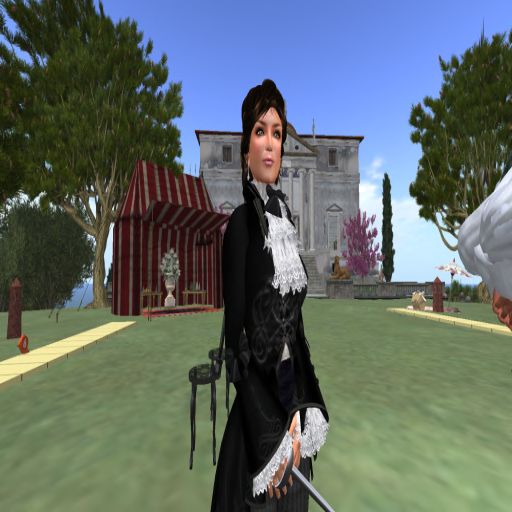
The MELIORIA fencing tournament turned out to be a wonderful event, and a success in terms of attendance, enjoyment, and high fencing level.
The Prince of MELIORIA had carefully prepared this feast ( with the deft and friendly help of Aria Vyper, Contessa di Mocenigo, CeeCee and Blue Revolution), adorning the lawns of the glorious Villa Vesuviana with tents and lovely blankets, where spring water, wines ,liquors and picnic baskets were at hand.
This event drew an incredible crowd, from all horizons, coming and going during the two hours and a half it lasted. Therefore, I will not be able to mention all attendants, as I usually do: please accept my apologies. it was entertaining and even enthralling, to see this fashionably elegant assembly and to hear the witty discussions and, ahemgossips.
The duellists of the day were , in no protocolar order: Capacitytodd Elswit, Prince of Melioria, our host, Marquesa Quecay Amat, Hera Poliatevska, professional fencer and Maitre dArmes in the Royal Court Fencing Group, Contessa Sophia Trefusis di Loredan, Doctor Pekel Panacek, Madame la Comtesse de Noailles, Senora Emma Streusel, Princess of Switzerland, Sir Blue Revolution, Her Grace the Duchesse de Rochefort, Conte Myron Byron di Loredan, Mademoiselle dAndelot, Joesf Fitzpatrick, Contessa Selina Vayandar di Loredan, and Monsieur de Monty-Merlin.
Four rounds were needed to reach the final, won by the irresistible Selina, Contessa di Loredan, over Hera Poliatevska. To crown this ceremony, the Prince of Melioria offered two prizes of 2000 gold coins and 1000 gold coins respectively to the winner and finalist.
The competitors gained also points for the Royal Courts fencing Group Award of Fencer of the Year, as follows:
- Maria-Antonia Barenhaut, Quecay Amat, Sophia Trefusis, Pekel Panacek, , Joesf Fitzpatrick, Monty Merlin: 1 point.
-Marie-Josette Laville, Melle DAndelot, Capacitytodd Elswit, Myron Byron: 3 points
- Emma Streusel, Blue Revolution: 5 points
-Hera Poliatevska: 8 points
- Selina Vayandar: 10 points.
(see for present rankings after 3 tournaments in my upcoming post).
And now A FEW ANECDOTES :
-As usual, a big controversy arose about fencing Ladies outfits: gowns or breeches? Well, this a far too serious matter for us, male fencers, to decide! We , who heartily endure scars and blood wounds, would NEVER take the chance of interfering between Ladies arguing about this: we are courageous, but no fools! ( with the possible exception of Blue Revolution, who suggested we could wear skirts in replyJ)
-CeeCee missed the Tournament, and we missed her : we learned (once again) that , as she was in charge of transferring the spring water bottles from the cellar to the picnic, she mistook them for the vodka bottles of the Prince, and realized too late her error ( too late meaning after sipping two bottles at least) so she overslept...
-At one moment, a little girl ran everywhere through the crowd . One of the Versailles Grandes Dames was trying to catch and keep her May I? She looks so much like my Pomeranian dog! she said.
-Extracts from the dialogues during the final duel :
-Hera Poliatevska: I must confess at this point, that I am not a part of any Court. I am from the peasantry, and I fence for a living, Mesdames.
-Duchesse de Rochefort: For a living? What do you mean? What a curious expression! ( I love learning new words and expressions)
-Selina Vayandar: For a livinglike work. A concept lost to you, perhaps.
-Duchesse de Rochefort: Oh! Work ! I learnt about work the other day, what a curious occupation!
-Gallyon Milneaux: *tries not to laugh*
-Duchesse de Rochefort: To work to earn moneyodd concept
-Hera Poliatevska: I work as a fencer, sometimes as a trainer
-Duchesse de Rochefort: Personally I think inheritance is much simpler
-Hera P. : Much simpler indeed, for those who are lucky!
-Myron Verne: tsk tsk tsk, never mind, Hera, focus on your fencing! 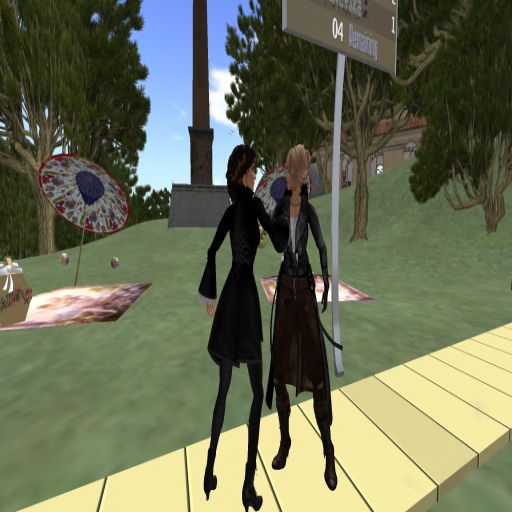
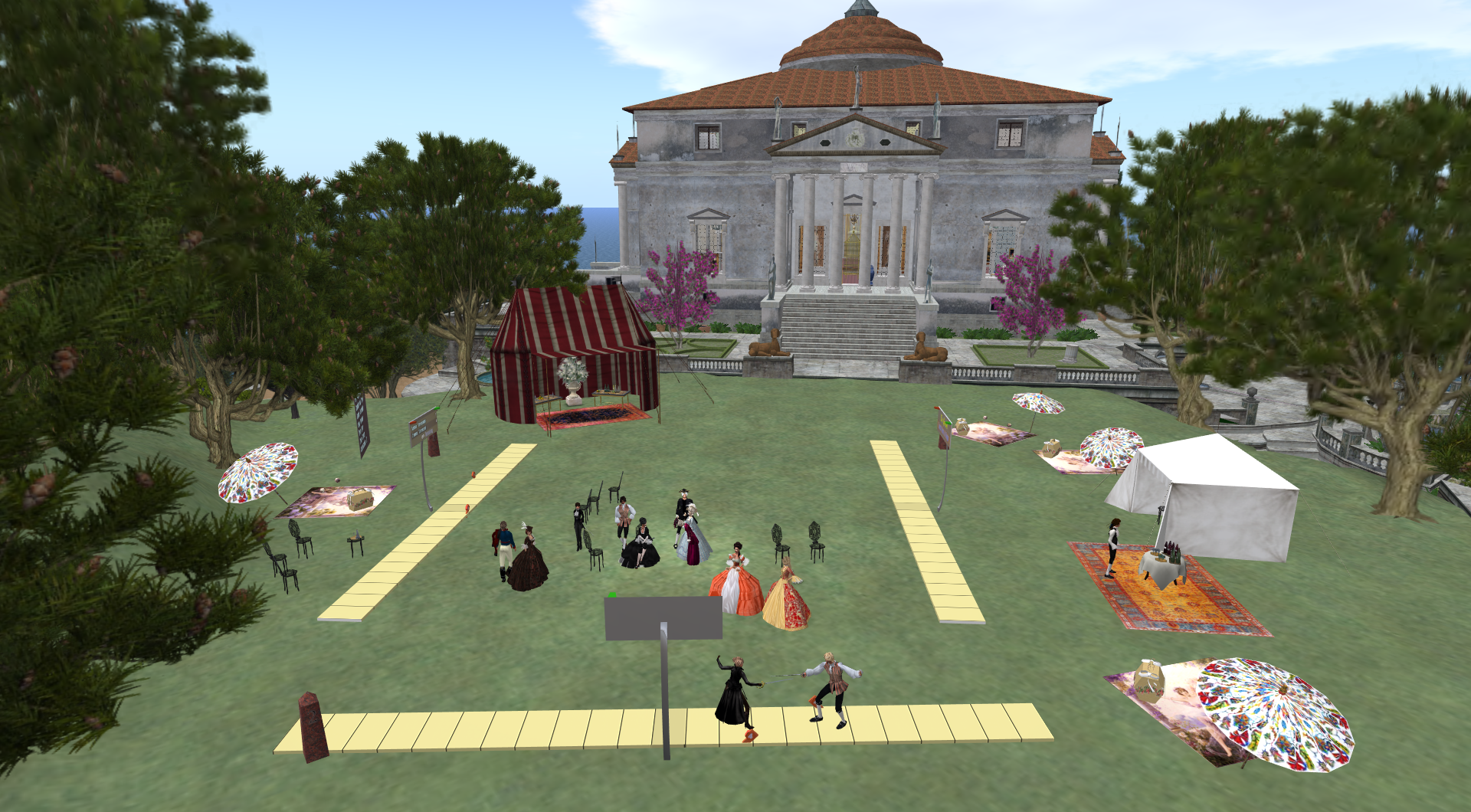
The Battle of Sedan Chairs ( pamphlet in the manner of Beaumarchais)
Listening recently to some comments in Royal Courts corridors, it seemed that sedan chairs are back in style again. New models should be available soon, and I have no doubt that they will be beautifully crafted. Perhaps events will follow like sedan chairs races, who knows? Anyhow, we cannot but be grateful to those who provide us, day in and day out, with their remarkable skills, all the commodities of our late 18 th century.
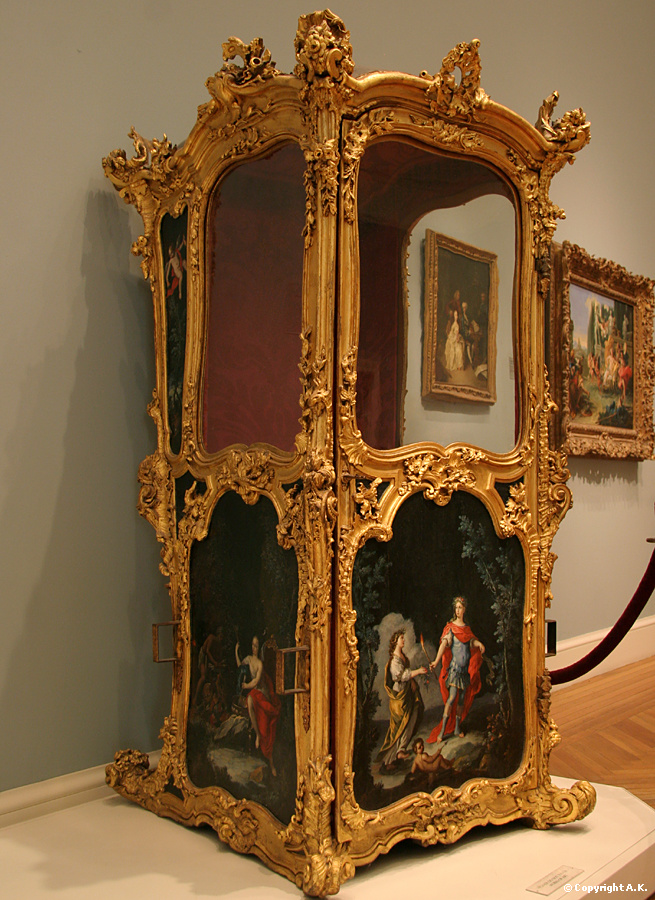 However, you will NEVER see me in a sedan chair. I have a strong personal dislike for this invention, based on the fact that I hate to see men ( porters, in this case) treated as low as horses replacement.
However, you will NEVER see me in a sedan chair. I have a strong personal dislike for this invention, based on the fact that I hate to see men ( porters, in this case) treated as low as horses replacement.
Some may argue that it is only a practical and funny mean of transportation, but it is not: it is slower than walking , highly uncomfortable, and I miss the amusing part in it. I can understand , in some circumstances, that Ladies use them to keep their formal shoes and dresses clean before a ceremony or event, and for short distances, but no more. Men should stay away from a sedan chair, they look ridiculous in it, and besides, I often stated that some of them use it more as a way to show off their pretended superiority , and their actual domination, with some disdain to other human beings. I do not belong in this , and I have the weakness to believe more in reconciling the traditional values of Nobility( protecting the people, and centering on our duties more than on our privileges) with the contemporary ideals of Enlightenment.
But , this being only a matter of opinion, after all, I would not have posted this pamphlet, had I not a funny and revealing story of sedan chairs to tell you.
One day, I rode through the narrow streets of Paris on my dear horse Sultan, when I was blocked by two sedan chairs, moving slowly forward and side by side, ( de conserve as we say in French), so that their owners could continuously converse through their side windows.
I recognized their arms on the chairs: Madame la Comtesse de Marsan, et Madame la Marquise dEsparbs, two long-time best gossip friends, two of a kind ( the kind of stuff that nightmares are made of, according to me).
Now you must know that the porters and valets of the Maison de Marsan and the Maison dEsparbs, were all Southerners: these Ladies had married a Comte from Languedoc, and a Marquis from Armagnac, regions were people (except nobles and grand bourgeois) still spoke the ancient langue dOc, or Provencal, quite different from the langue doil, spoken in the North, from which French was derived. The Ladies, as superior as they thought they were, could not understand their porters, but the valets could very well understand them.
By then, a long string of horsemen, carriages, merchants and passers-by was now queuing up behind the sedan chairs, and the Ladies did not seem to bother: I could even have sworn they enjoyed it.
Suddenly, as I was losing patience, the four porters began to sing, alternatively, a charming traditional melody, with lyrics in their language. I distinctly heardthe Comtesse de Marsan say:Oh, Ma Chre, listen to their beautiful song! Dont they sound like modern day troubadours?
-O Yes, lovely, indeed, Ma Chre! answered the Marquise. And how it shows they enjoy their work!
It was difficult for me to hold back a laugh: as you may know, I was born in Provence, and I understand the langue dOc. And the translation of the lyrics of this beautiful song was approximately the following:
-Marsan porters: Our Comtesse eats too much, and she weighs bout a ton
-dEsparbes porters: -Our Marquise is lighter, but her feet are stinking
-Marsan Porters: -Lets toss em and bump em for the next mile
-dEsparbes porters: -Oh yes, and if they dont know why, we do!
Thats the way the world goes
And why youll NEVER see me in a sedan chair.


